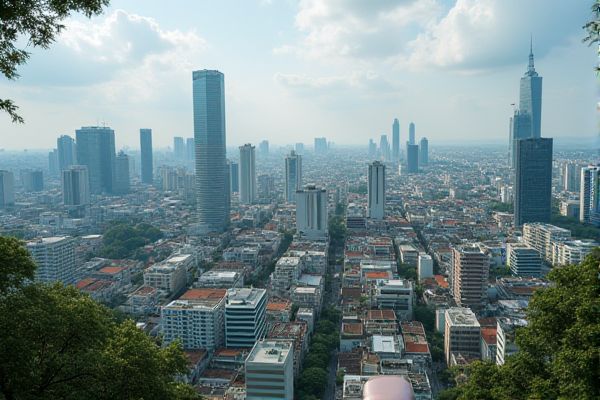
Healthcare facilities in Thailand: Universal health coverage available. Private hospitals offer high-quality care. Public hospitals lower cost, longer wait times. Non-citizens need health insurance. Bangkok features top medical facilities. Thai healthcare professionals highly trained. Many hospitals offer English-speaking staff. Telemedicine services are growing. Special clinics available for expats. Vaccinations required for some regions.
Universal health coverage available.
Thailand's Universal Coverage Scheme (UCS), also known as the Gold Card or 30-baht scheme, delivers universal health coverage to the majority of the population, primarily funded by the national budget and managed by the National Health Security Office. This scheme offers predominantly free medical treatment, encompassing general medical care, rehabilitation services, high-cost medical treatment, and emergency care. The [Universal Coverage Scheme](https://en.wikipedia.org/wiki/Universal_Coverage_(Thailand)) has significantly increased access to health services and effectively reduced catastrophic health expenditures.
Private hospitals offer high-quality care.
Private hospitals in Thailand are renowned for their high-quality, efficient medical services, making them a preferred choice for both expats and medical tourists. These facilities stand out due to their shorter wait times, advanced medical technologies, and a greater selection of treatments. Notably, many hospitals, such as Bumrungrad International Hospital and Bangkok Hospital, offer world-class medical care with international accreditations like JCI certification. The availability of well-trained specialists and English-speaking staff further enhances the healthcare experience for foreign patients. Despite offering services at par with top Western countries, the costs in Thailand remain significantly lower, attracting a steady stream of medical tourists from the US and Europe.
Public hospitals lower cost, longer wait times.
Public hospitals in Thailand offer lower costs but are characterized by longer waiting times, often requiring patients to arrive early in the morning to secure a queue number, and can have waiting times for surgery of several months. For more detailed insights into healthcare options available for expatriates and locals alike, visit the Expatica website, which provides a comprehensive guide on navigating the healthcare system in Thailand.
Non-citizens need health insurance.
Non-citizens in Thailand, including expats and tourists, are generally required to have private health insurance to access medical services. For long-stay visas, such as the Non-Immigrant O-A Visa, expats must show evidence of a health insurance policy that covers specific minimum amounts for outpatient and inpatient care from an approved Thai insurance provider. For more details, visit the Thai Embassy website to ensure compliance with the latest health insurance requirements.
Bangkok features top medical facilities.
Bangkok features top-notch medical facilities, including prominent government hospitals like King Chulalongkorn Memorial Hospital and Ramathibodi Hospital, which offer specialized care, advanced medical technologies, and are affiliated with prestigious universities for medical education and research. For those seeking private healthcare, hospitals such as Bumrungrad International Hospital, Samitivej Sukhumvit Hospital, and Bangkok International Hospital provide world-class services with state-of-the-art facilities and international accreditations. To learn more about these esteemed institutions, visit the article on the best government hospitals in Bangkok.
Thai healthcare professionals highly trained.
Thai healthcare professionals are highly trained through comprehensive courses and programs overseen by the Medical Council of Thailand, which include education in law, management, technology, and communication, as well as integrated training and collaboration with various organizations to enhance their skills and efficiency.
Many hospitals offer English-speaking staff.
Many hospitals in Thailand, such as Bumrungrad International Hospital, Bangkok Hospital, and Bangkok Hospital Chiang Mai, offer English-speaking staff, including doctors and other medical professionals, to cater to the needs of expats and international patients, ensuring clear communication and high-quality healthcare services. For more detailed insights on this, you can explore the Best Thailand Private Hospitals for Expats blog. These facilities are well-equipped to provide comprehensive care, making them an excellent choice for those residing in or visiting Thailand.
Telemedicine services are growing.
Thailand's telehealth market is projected to grow significantly, reaching $9.51 billion by 2030 with a CAGR of 29.1%, driven by the increasing adoption of digital healthcare, a shortage of medical professionals, and rising demand for healthcare services, particularly among the rapidly aging population and those with chronic diseases. Key factors include technological advancements, government initiatives, and the expansion of Telemedicine Services by hospitals and private sector players to address healthcare access gaps and meet growing healthcare needs.
Special clinics available for expats.
Thailand offers several special clinics and hospitals that cater specifically to expats, including Bumrungrad International Hospital, Bangkok Hospital, and Samitivej Hospital in Bangkok, known for their high standards, English-speaking staff, and shorter waiting times. Outpatient clinics such as MedConsult Clinic, Thai Travel Clinic, and Samitivej Suvhanabhumi Medical Clinic provide convenient and fundamental healthcare services. For a detailed insight into healthcare and other essential services tailored for expatriates, you can find more information in the Expat Guide Thailand, which covers a range of topics crucial for expats navigating life in Thailand.
Vaccinations required for some regions.
In Thailand, vaccinations such as typhoid, hepatitis A, polio, Japanese encephalitis, and rabies are recommended depending on the region and activities. The Japanese Encephalitis vaccines are particularly advised for those traveling to rural areas, especially in the northern regions, while malaria precautions are necessary for border provinces near Myanmar, Cambodia, Laos, and Malaysia.
